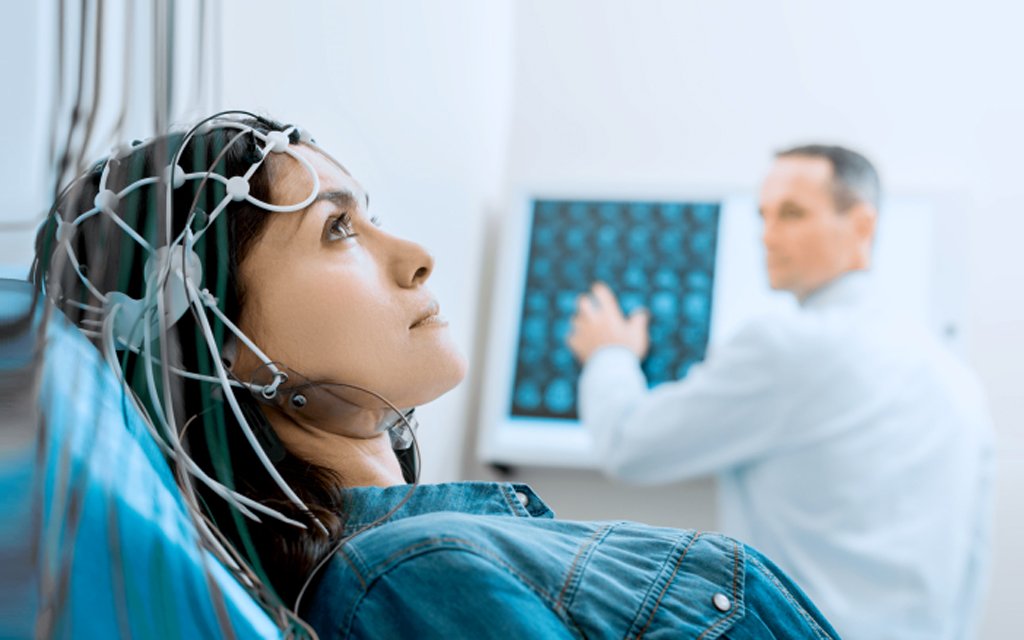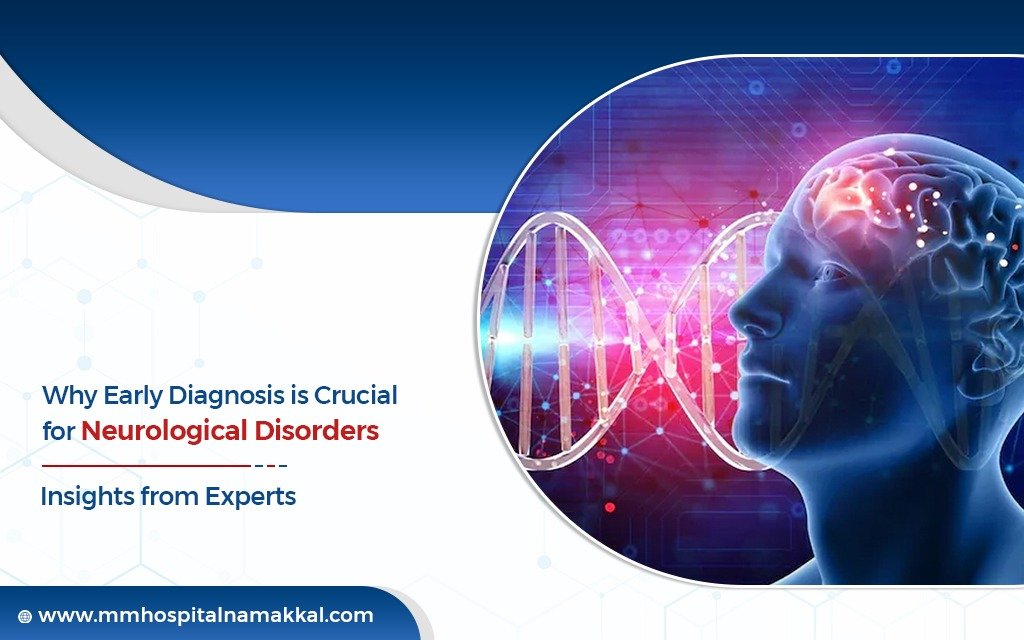The brain, spinal cord, and nerves are all impacted by neurological illnesses, which affect millions of people globally. Conditions such as Stroke, Parkinson’s disease, Alzheimer’s, Epilepsy and Multiple Sclerosis can significantly affect daily life. Early diagnosis plays a crucial role in managing these conditions effectively, improving quality of life and even preventing further complications. Experts at MM Hospital, Namakkal emphasize the importance of recognizing symptoms early and seeking medical attention without delay.
Understanding Neurological Disorders
Diseases that impact the nerve system are known as neurological disorders. They can cause problems with movement, memory, sensation and even basic bodily functions. Some disorders progress slowly, while others may appear suddenly and worsen quickly. Early diagnosis allows doctors to understand the condition better and provide the most effective treatment.
Many neurological disorders are degenerative, meaning they worsen over time if left untreated. Others may result from infections, injuries or autoimmune conditions. Regardless of the cause, detecting the disease at an early stage gives medical professionals more opportunities to manage symptoms and improve outcomes.
The Role of Early Diagnosis
1. Better Treatment Outcomes
When Neurological Disorders are diagnosed early, treatment can begin before the condition worsens. Many neurological diseases, such as Parkinson’s or Multiple Sclerosis, do not have a cure, but early intervention can slow their progression and improve symptoms. In some cases, early treatment can even prevent certain conditions from developing into more severe stages.
For example, in epilepsy, early detection of seizure patterns allows doctors to prescribe the right medication to control episodes before they become frequent and severe. Similarly, in Parkinson’s disease, medications and physical therapy can help manage motor symptoms if started early.
2. Preventing Further Complications
Some conditions, like Stroke, require immediate medical attention. The sooner a stroke is identified and treated, the lower the risk of permanent disability. Quick diagnosis of infections like meningitis can also prevent life-threatening complications.
Neurological disorders can also affect other body functions. For instance, untreated multiple sclerosis may lead to paralysis, vision problems or chronic pain. Early intervention ensures that these complications are minimized and patients can lead a better quality of life.
3. Slowing Disease Progression
Diseases like Alzheimer’s and Parkinson’s progress over time. While there is no cure, early diagnosis allows doctors to use medications and therapies that can slow down their impact. This helps patients maintain independence for a longer period.
In conditions like amyotrophic lateral sclerosis (ALS), early intervention with therapy and medication may help prolong life expectancy and preserve essential motor functions for as long as possible.
4. Improved Quality of Life

Early diagnosis provides an opportunity for patients and their families to make necessary lifestyle changes. Simple steps like a proper diet, regular exercise, and medications can help manage symptoms better and ensure a more active life.
In neurological disorders like multiple sclerosis or epilepsy, early diagnosis allows patients to receive therapies that help maintain their ability to work, drive, and perform daily activities without major disruptions.
5. Better Planning for the Future
When a neurological condition is diagnosed early, patients and their families can prepare for the future. They can explore treatment options, plan financial and caregiving needs, and make important decisions about their health and well-being.
For progressive disorders like Alzheimer’s, families can plan ahead by arranging care facilities, modifying living spaces for safety, and setting up legal and financial arrangements before the disease worsens.
Common Neurological Disorders and Their Early Signs
1. Stroke

Early signs: Sudden numbness, confusion, trouble speaking, loss of balance or severe headache.
Why early diagnosis matters: Immediate treatment reduces the risk of long-term disability and death. The first few hours after a stroke, known as the “golden window,” are critical for minimizing damage to brain cells.
2. Alzheimer’s Disease

Early signs: Memory loss, difficulty in problem-solving, confusion about time and place, mood changes.
Why early diagnosis matters: Medications and lifestyle changes can slow cognitive decline and improve daily function. Early intervention can also help patients participate in clinical trials that may offer new treatment options.
3. Parkinson’s Disease

Early signs: Tremors, stiffness, slow movements, loss of balance.
Why early diagnosis matters: Early treatment can manage symptoms and improve movement and coordination. Physical therapy and medications can prevent severe mobility loss.
4. Epilepsy
Early signs: Seizures, sudden confusion, unconsciousness.
Why early diagnosis matters: Proper medications can control seizures and reduce risks associated with sudden episodes. Identifying triggers early on can help patients avoid situations that could provoke seizures.
5. Multiple Sclerosis (MS)

Early signs: Weakness, vision problems, tingling in limbs, coordination difficulties.
Why early diagnosis matters: Early intervention can delay symptoms and improve mobility. Physical therapy and lifestyle adjustments can help patients maintain independence longer.
How MM Hospital, Namakkal, Helps with Early Diagnosis
At MM Hospital, Namakkal, we use advanced diagnostic techniques to detect neurological disorders at an early stage. Our expert neurologists focus on identifying warning signs and providing timely intervention. Some of the key diagnostic methods include:
1.Neurological Examinations
Doctors perform physical and cognitive tests to assess nerve function, muscle strength, coordination, and reflexes. These simple tests can often detect abnormalities early.
2. Brain Imaging Tests
MRI and CT scans help detect abnormalities in the brain, such as strokes, tumors, or degenerative conditions. These tests provide detailed images that allow doctors to analyze brain structure and identify early changes.
3. Electromyography (EMG) and Nerve Conduction Studies
These tests evaluate nerve and muscle function, helping diagnose conditions like neuropathy and muscular disorders. If performed early, they can prevent permanent nerve damage.
4. Electroencephalogram (EEG)

EEG measures brain activity and helps diagnose epilepsy and other seizure disorders. Continuous monitoring with EEG helps doctors understand seizure patterns and prescribe the most effective treatments.
5. Blood Tests and Genetic Testing

Certain blood markers can indicate neurological disorders. Genetic tests help identify inherited conditions, allowing doctors to start preventive care if needed.
What to Do If You Notice Symptoms
If you or a loved one experience any symptoms of a neurological disorder, seek medical advice immediately. Here are some important steps to take:
Do not ignore mild symptoms: Small changes in movement, memory, or speech could be early indicators.
Consult a specialist: A neurologist can perform detailed evaluations and recommend further tests.
Maintain a health journal: Track symptoms, their frequency, and triggers to help doctors with diagnosis.
Follow medical advice: Early treatment can prevent complications and improve overall well-being.
Conclusion
Neurological disorders can be challenging, but early diagnosis makes a significant difference in treatment and quality of life. At MM Hospital, the Best Neurology Treatment Hospital, we are committed to helping patients with early detection and advanced treatment options. If you notice any warning signs, don’t delay—consult a neurologist today. Taking timely action can help you or your loved ones lead a healthier and more active life.


